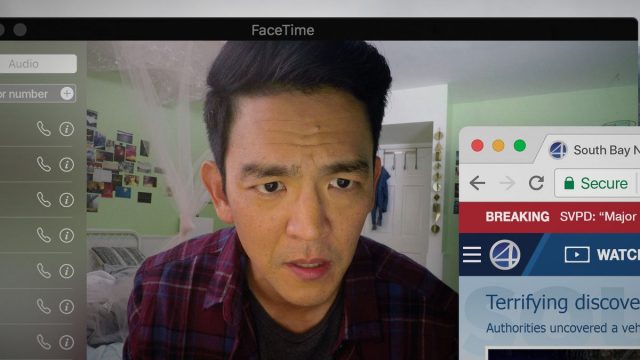Searching takes place entirely within laptop screens and uses this very in-the-moment gimmick to craft an entertaining family drama and mystery. All the clues are scattered in plain sight like Easter eggs and there’s a satisfaction in putting together the pieces yourself or seeing how the details accumulate into the final picture.
David Kim (John Cho), his wife Pamela (Sara Sohn) and their daughter Margot have the ideal, loving family which we meet through their various saved photos and videos, emails and eventually social media posts. As their daughter Margot grows up, Pamela battles lymphoma – a battle she finally loses. It’s a (nearly) dialog-free opening montage similar to the one that began Pixar’s Up, with a similar lump-in-the-throat conclusion. Jump forward in time. David and Margot (now played by Michelle La) speak mainly in texts and the occasional FaceTime. They treat each other with kid gloves, waiting for the other to drop their brave smile first.
One night David misses a series of calls from Margot. The next day his panic escalates as she remains missing. Her laptop is the only route to finding her. David realizes he doesn’t know any of her friends and learns that she has been lying about her whereabouts. As he searches deeper into Margot’s online accounts for clues, he also faces a darker truth: the daughter he thought he knew may have disappeared far earlier.
Cho is very good here, expressing fatherly love strained through grief. His scenes with La have an easy affection and sadness to them emphasizing the emotional gulf that has grown in the time since the gangbusters opening. Acting exclusively through FaceTime messages and candid video clips is no easy task. Debra Messing seems flummoxed by the shift in method and turns in sub-network procedural work as the detective assigned to Margot’s case.
This is a small blip in an otherwise successful conceit. The all-screen method will draw comparisons to Unfriended, the surprisingly effective teenage laptop horror movie from 2014. But unlike that movie’s static events played out in real time, Searching contains the traditional elements of cuts, pans and closeups and then uses hesitant mouse movements and blinking cursors to build Cho’s performance. Text responses that would expose buried feelings and fears are deleted and replaced. Details about David float in the margins, like the way his browser attracts banner ads for depression medication.
Searching doesn’t plumb the online world for technophobic scares (although there is one “don’t go in there!” moment when a mouse hovers over a link to Reddit) and the darker aspects of Internet culture appear but never overwhelm. Instead first-time director Aneesh Chaganty and co-writer Sev Ohanian stick to drama (veering into melodrama during some overwrought newscasts), humor, and solid story beats as befit a film that adults could comfortably watch with their own teens. The collection of posts and photos make a trail that may or may not lead David closer to knowing his daughter or her whereabouts. Would somebody get a clearer picture of us if they collected all the secrets we whisper into the web?

